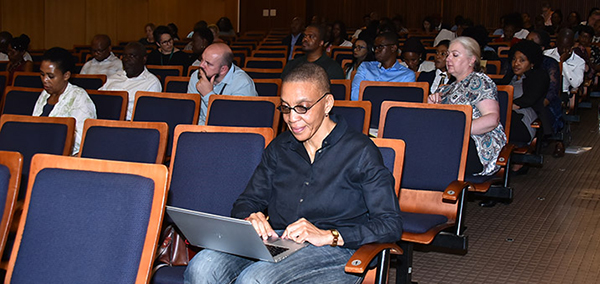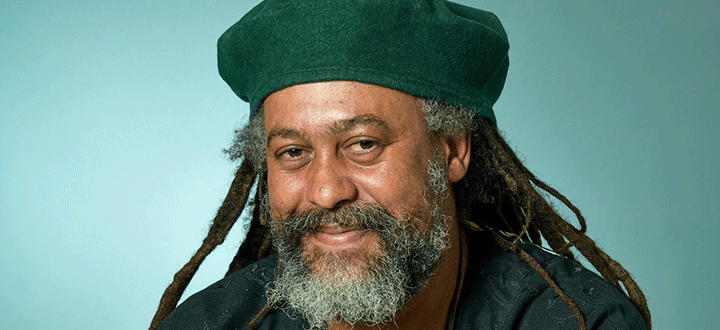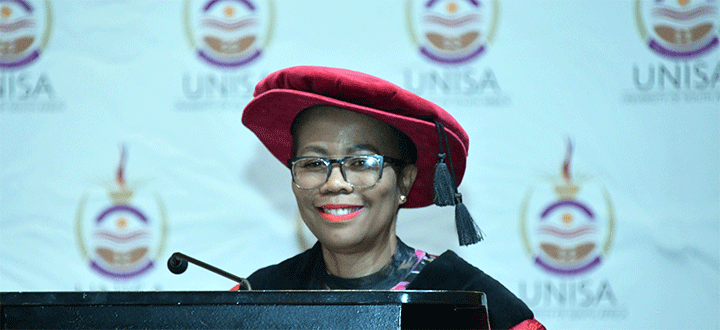College of Education
ODL in 4IR context
On 19 February 2020, the United Nations Educational, Scientific and Cultural Organisation (UNESCO) Chair on Open Distance Learning (ODL) at Unisa held its first research seminar to reflect on the effect of the 4th Industrial Revolution (4IR) on higher education and solutions to develop much-needed skills to safeguard future graduates.
The seminar was entitled Open Distance Learning in the 4IR: Achievements, challenges and best practices.
Delivering the keynote address, Prof Gugu Moche, former Vice-Principal in Teaching, Learning, Community Engagement and Student Support, who is now an academic in the College of Science, Engineering and Technology, challenged academics to be innovative in their approach to the creation of curriculum that is relevant and responsive to the needs of the country. "How do we move away from students who can write examinations to those who can critically think," she questioned. "We also need to support students in ways that are innovative, inclusive and integrated."

Prof Gugu Moche, former Vice-Principal: Teaching, Learning, Community Engagement and Student Support & the delegates.
Employability of our students
Among the challenges Moche shared was that of assisting the university to sustain itself and future graduates. She spoke about skillsets, in the context of automation substitute for labour across the entire economy. Her belief is that the net displacement of workers by machines might exacerbate the gap between returns to capital and labour. "The scarcest and most valuable resource in an era driven by digital technologies will be neither ordinary labour nor ordinary capital; rather it will be those people who can create new ideas and innovations." She added that academic institutions sometimes forgot that the core business of education is to generate ideas and produce problem solvers. "How do we even begin to train and develop the talent of students for future jobs?"

Prof Moeketsi Letseka, UNESCO Chair on Open Distance Learning
To strengthen the university’s online presence, Moche advised academics to teach students cyber security because it comes with vulnerabilities and securities of institutions. With more knobs, connections and the burden of connectivity, she said systems needed to be more secure. "Networks need to be mapped to assess the risk and critical factors relating to security. Such an assessment should examine accessibility to systems, such as possible threats from internal sources, disgruntled employees to internal human error, and external sources, including hackers and cyber terrorists."
Reflecting on the role of higher education, Moche stated that the core mission of this sector remained the same - to ensure quality of learning through teaching. "We will enable the students to get the latest knowledge through exploratory research and sustain the development of societies by means of service." She stated that the country’s higher education system in this era should put innovation, both evolutionary and revolutionary, high on its agenda. "In general, innovation based on existing technologies, the so-called evolutionary type; while revolutionary type of innovations focuses on inventions of new technologies."
A panel discussion presented by three Unisa professors, namely Oupa Mashile, Mpine Makoe and Silindile Ngubane, focused on the university’s readiness towards delivering ODL in the advent of 4IR.
Makoe commented that 4IR is not a topic only spoken about in higher education. "It's virtually everywhere," she said. Universities need to focus on skills and reskill people for 4IR. Also, she noted that academic learning will be personalised and that recognition of prior learning (RPL) and open educational resources (OER) would be very critical. "We need to explore and digitise to help students flourish in their future jobs."
Mashile mentioned that students from low socioeconomic statuses should be accommodated as well. He strongly believes that technology can be used to understand the open distance student better. "We should seek partnerships to customise service to our students."
Deliberating on the inclusion of marginalised communities, Ngubane stated that we have forgotten about our students despite the fact that Unisa is a university of choice for marginalised students. She also highlighted issues of ethics and flexibility to give students the best service.
According to Prof Moeketsi Letseka, incumbent of the UNESCO Chair on ODL, the academic work at Unisa should be undergirded by open, distance and e-learning (ODeL). "We need to get all colleges to embrace distance education," he said. The seminar provided delegates with a provocative analysis on the role of education in the 4IR context.
* By Lesego Ravhudzulo, Journalist, Department of Institutional Advancement
Publish date: 2020-02-25 00:00:00.0


 President Ramaphosa appoints Unisan to the CRL Rights Commission
President Ramaphosa appoints Unisan to the CRL Rights Commission
 Unisa VC appointed for second term, looks back on the 2024 academic year
Unisa VC appointed for second term, looks back on the 2024 academic year
 From passion to profession: Sonto Mthwane's journey in tourism management
From passion to profession: Sonto Mthwane's journey in tourism management
 Uniting for open knowledge
Uniting for open knowledge
 Unisa to partner with Government to tackle water, energy and infrastructure challenges
Unisa to partner with Government to tackle water, energy and infrastructure challenges